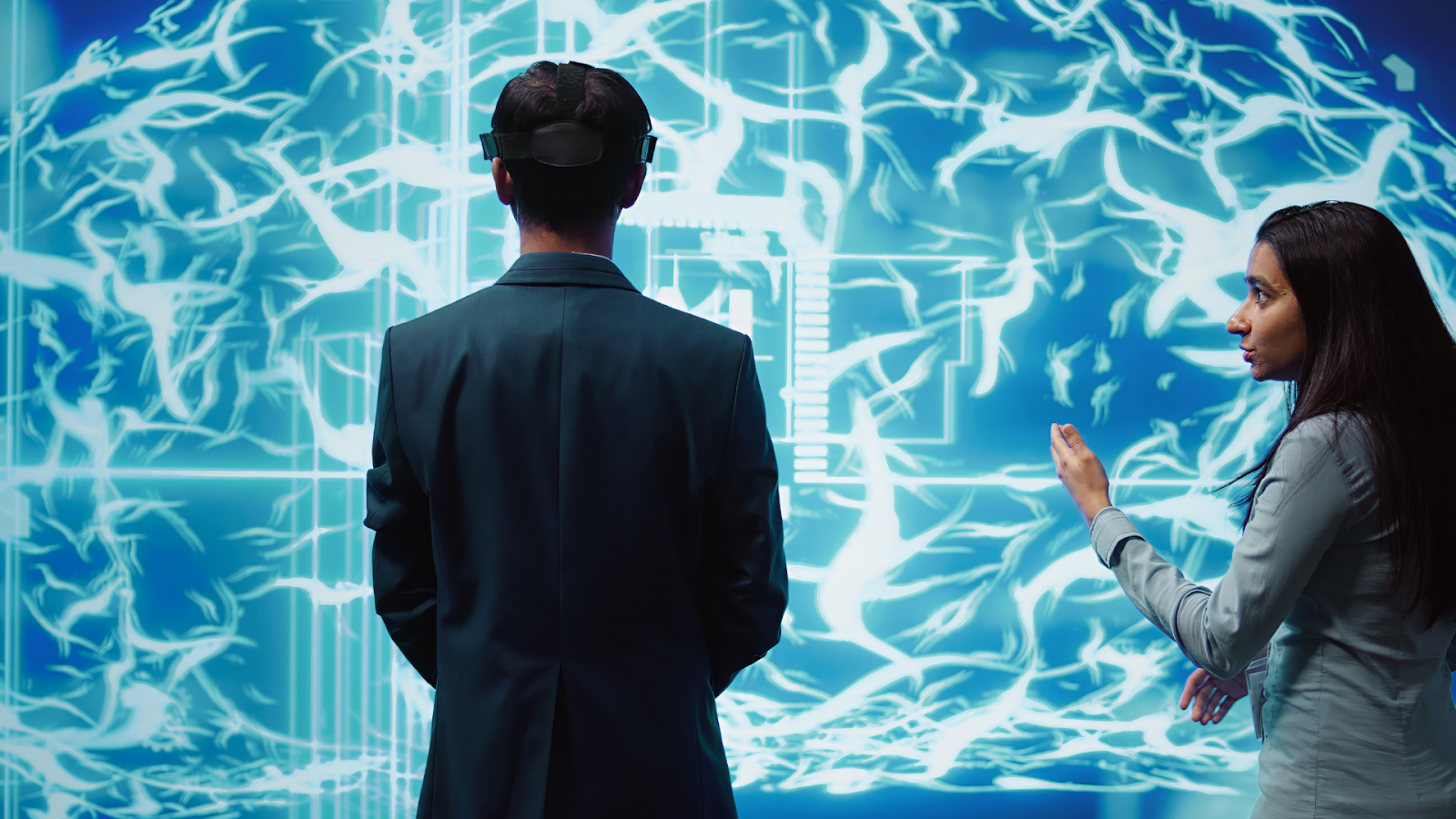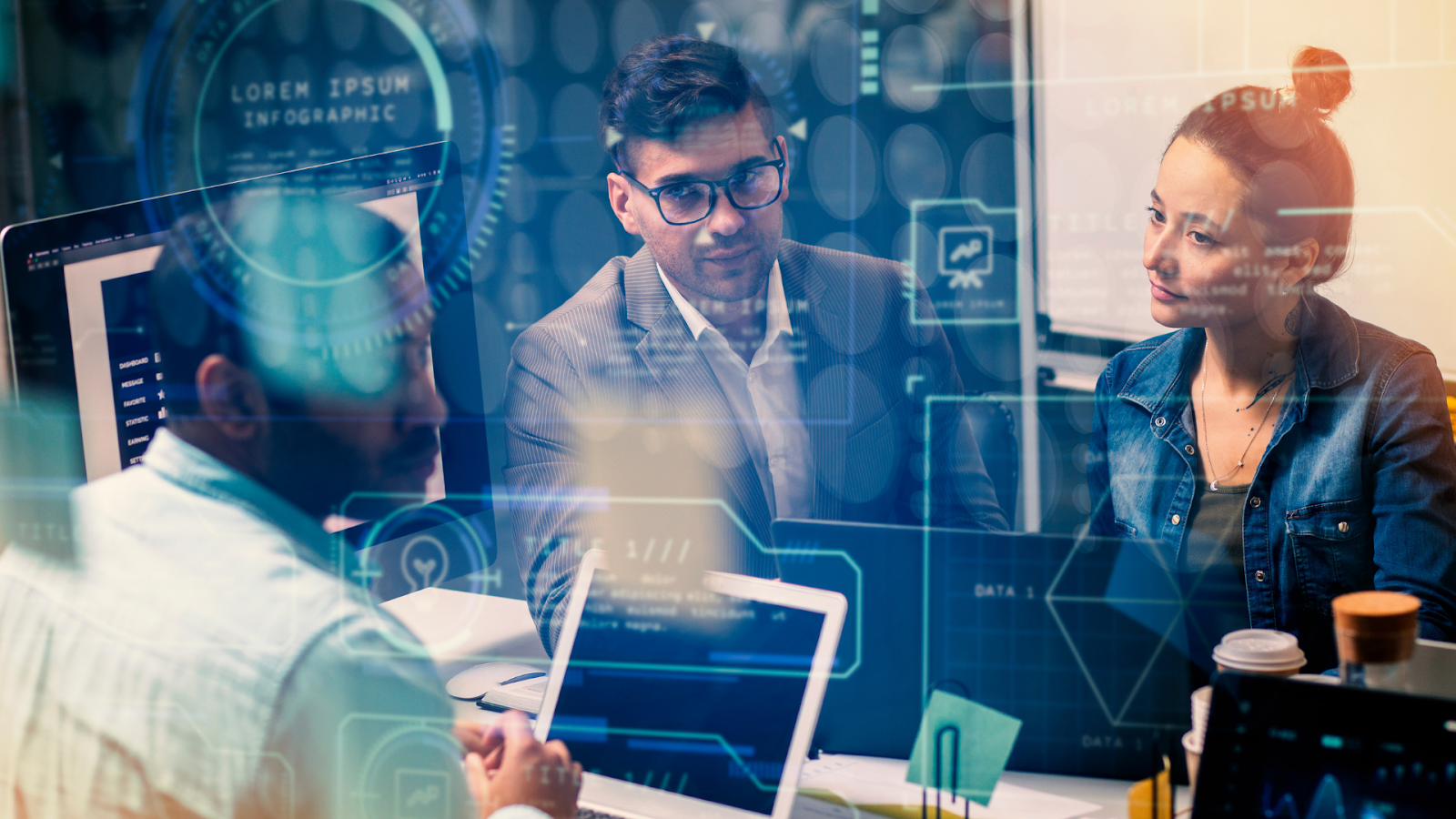Human Resource functions are undergoing a massive shift, and at the center of it is artificial intelligence. From how companies attract and hire talent to how they engage, retain, and develop their workforce, AI is impacting the core of HR operations.
According to Gartner, 70% of organisations will leverage AI to deliver personalised employee experiences by the end of 2025, signalling a major shift from traditional HR practices to intelligent, data-driven systems.
For organisations, this rapid transformation presents both a powerful opportunity and a clear imperative: adapt or fall behind. In this article, we'll explore how AI is impacting HR activities, practical use cases, and actionable insights for HR teams ready to embrace this transformative technology.
TL; DR:
- AI is streamlining HR processes, saving time by automating administrative tasks.
- Data-driven insights from AI help HR teams make more informed decisions about recruitment and employee engagement.
- AI enables personalised employee development by identifying skill gaps and suggesting relevant training.
- AI improves employee retention by predicting potential turnover and identifying engagement risks.
- Successful AI adoption in HR requires investing in training, addressing privacy concerns, and maintaining transparency with employees.
The Role and Impact of AI in HR Management

Managing people involves more than just hiring and payroll. It’s about understanding workforce trends, improving operations, and making smarter decisions. Artificial Intelligence has become a game-changer in HR, automating time-intensive processes and reducing human error.
A recent PubMed Central study emphasised how AI's integration into HR processes can both improve efficiency and raise critical concerns around transparency and accountability, particularly in decision-making for hiring and performance evaluations. Additionally, a global survey cited by Consultancy ME found that HR leaders report that AI is already delivering measurable improvements in speed and decision quality within their organisations.
Where AI Is Making the Biggest Difference in HR?
As AI continues to evolve, its most immediate and measurable impact can be seen in key areas of the HR function. From hiring to retention, here’s where AI is driving the biggest transformation:
- Smarter Hiring & Screening: AI tools can quickly review resumes and applications, identifying the best candidates based on predefined criteria. This helps speed up the hiring process and makes it more efficient.
- Customised Learning Paths: AI looks at employees' skills and performance to suggest tailored training programmes. This helps employees develop in their roles and ensures they’re always learning and growing in line with company needs.
- Performance & Sentiment Analytics: AI analyses feedback and performance data to provide fair and consistent insights into employee performance. This makes it easier for HR to assess performance without bias.
- Retention Forecasting: By looking at patterns in employee behaviour, AI can predict who might be at risk of leaving. This gives HR a chance to address issues like job satisfaction before they escalate into a larger problem.
- HR Chatbots & Automation: AI-powered chatbots take care of everyday tasks like answering questions, scheduling, and onboarding. This frees up HR’s time, making things quicker and easier for employees.
With AI already impacting core HR activities, the question is no longer if it should be adopted but how soon. That’s why HR teams can’t afford to ignore the strategic advantage AI now offers.
Why HR Teams Can’t Afford to Ignore AI?

The impact of artificial intelligence on human resource management is clear, yet many HR teams are still slow to adopt it. Here’s why AI should be a priority:
1. Increased Efficiency
AI helps reduce the time spent on repetitive tasks, enabling HR teams to focus on more meaningful work, such as employee development and performance management.
How does AI make it happen?
- Automating repetitive tasks: AI can handle tasks like scheduling interviews, processing resumes, and updating employee records.
- Speeds up data processing: AI systems can make functions like payroll management and benefits tracking faster and more accurate.
- Improves workflow efficiency: AI identifies bottlenecks in HR processes, helping teams focus on strategic activities that add more value.
2. Data-Driven Insights
AI enables HR teams to access deeper insights from large datasets, empowering them to make data-driven decisions for recruitment, employee engagement, and retention strategies.
How does AI make it happen?
- Uncovers hidden patterns: AI tools analyse employee data to reveal trends or correlations that human analysts might miss.
- Predictive analytics: AI can forecast trends, such as employee turnover or performance issues, enabling HR to take proactive steps.
- Enhances recruitment decisions: AI helps HR match candidates to roles based on qualifications, experience, and fit, improving hiring decisions.
3. Personalisation
AI allows HR teams to offer tailored training and development opportunities, ensuring that employees receive the learning and development opportunities that align with their personal and professional growth.
How does AI make it happen?
- Tailored learning paths: AI can recommend training programs based on individual skills, performance, and career aspirations.
- Adapts to learning preferences: AI systems adjust the learning experience to suit different employee learning styles (video, interactive, or written content).
- Continuous feedback: AI tracks progress and provides real-time feedback, optimising employee development.
4. Scalability

As organisations expand, HR processes become increasingly complex. AI provides scalable solutions that grow with the organisation, helping HR manage larger teams without sacrificing quality or efficiency.
How does AI make it happen?
- Processes large volumes of data: AI can easily analyse and manage vast amounts of employee data, helping HR teams keep up with a growing workforce.
- Automates repetitive tasks: AI handles functions such as payroll, performance evaluations, and compliance management, even as the team expands.
- Adapts to change: AI solutions can scale with the business and adjust to new HR processes as the organisation evolves.
As organisations embrace AI in HR, the need for strong leadership in handling this transformation has never been more critical. Corpoladder’s Team management and leadership in the AI age course is designed to equip leaders with the skills required to lead effectively in an AI-powered environment.
The course focuses on building AI-driven decision-making, emotional intelligence, and team agility, while encouraging resilience and adaptability. Leaders will also learn how to manage hybrid AI/human teams, ensuring that they can drive success in the rapidly evolving business world.
Suggested read: 7 Essential HR Skills Every Professional Should Master
Given the undeniable advantages that AI offers, it’s essential to examine specific use cases where AI is already making a substantial impact.
Top Use Cases of AI in HRM
Beyond automation, AI introduces deeper insights, predictive capabilities, and innovative ways to enhance workplace culture. Here are some key opportunities AI opens for HR:
- Predictive Talent Acquisition: AI anticipates hiring needs by analysing business growth trends, industry demand, and workforce turnover patterns.
- Hyper-Personalised Employee Growth Plans: AI maps individual career trajectories, suggesting role changes and skill development programmes tailored to each employee.
- Real-Time HR Analytics for Business Strategy: AI provides live insights into workforce productivity, skill distribution, and effectiveness, enabling HR strategies to align with business goals.
- Emotional Intelligence in AI Tools: AI-driven virtual assistants detect employee stress levels and mental well-being through voice analysis and sentiment detection.
- AI-Driven Leadership Development: AI identifies high-potential employees and recommends leadership training, ensuring future leaders are promoted within the company.
- Adaptive Workforce Planning: AI enables HR to dynamically allocate resources by predicting project needs and matching talent to the most suitable roles.
- Bias-Free Compensation Analysis: AI ensures equal pay by analysing salary structures, detecting wage gaps, and recommending unbiased compensation adjustments.
- Digital Twins for Workplace Simulations: AI-powered digital models predict the impact of HR policies before implementation, helping organisations make data-backed decisions.
While AI is making a big impact in optimising HR processes, it also faces challenges and barriers that must be overcome for successful implementation.
Overcoming Common Barriers to AI Adoption in HR

Despite the advantages, many HR teams remain hesitant to adopt AI. Some of the most common barriers include:
1. Lack of Understanding
Many HR professionals are uncertain about the full potential of AI in their department, which can lead to hesitation or slow the adoption of AI tools. This knowledge gap can be addressed with proper training and awareness efforts.
How can you overcome these?
- Offer clear training programmes: Provide sessions that explain the practical benefits of AI in HR, covering both its technical uses and strategic advantages.
- AI workshops and demonstrations: Organise hands-on workshops where HR professionals can see AI tools in action and understand their value first-hand.
- Encourage peer learning: Have experienced HR professionals or AI experts mentor others, helping to spread knowledge and improve understanding of AI tools across the team.
To build AI readiness across your HR function, your organisation needs leaders who can think strategically, communicate clearly, and drive change with confidence. Corpoladder’s Vision and Strategy for Emerging Leaders course is designed to develop those capabilities.
This 5-day programme equips your emerging HR leaders with the skills to create a compelling vision, align it with organisational goals, and lead teams through transformation. Through practical exercises, role plays, and real-world simulations, your organisation will build a stronger leadership pipeline—ready to embrace AI and other future-focused innovations.
2. High Initial Investment
AI adoption in HR requires an upfront investment, but the long-term benefits often outweigh the costs. It’s essential to view this as an investment in the future, which will improve efficiency and productivity over time.
How can we overcome these?
- Focus on the long-term benefits: Highlight the savings and productivity improvements that result from using AI, such as automating routine tasks and reducing human error.
- Start with pilot projects: Begin by testing AI tools in specific HR areas, such as recruitment or performance management, to assess their impact before scaling.
- Consider AI-as-a-service: Use AI-powered HR platforms that offer subscription-based models, reducing the initial investment and making it more affordable for businesses of all sizes.
3. Data Privacy Concerns

AI tools often rely on large amounts of employee data, which raises concerns about privacy and security. It’s essential for HR teams to implement solutions that comply with privacy laws and ensure data security.
How can we overcome these?
- Ensure compliance with regulations: Select AI tools that comply with privacy regulations, such as GDPR or CCPA, to safeguard sensitive data.
- Use data encryption: Select AI systems that offer strong data encryption to secure employee information.
- Conduct regular data audits: Perform regular audits to ensure that AI tools handle data securely and transparently, while keeping employees informed about what data is collected and how it is used.
Also read: Overcoming Common Challenges in Leadership Training
Successfully integrating AI into HR functions requires strong leadership and a well-prepared team. With the right training, your HR professionals can fully leverage AI to drive meaningful impact across the organisation.
How Can Organisations Effectively Integrate AI into HR?
Many HR teams face roadblocks when it comes to AI adoption—from limited technical knowledge and resistance to change, to uncertainty around ethical data use and privacy concerns. These challenges often result in slow or ineffective implementation, preventing organisations from realising AI’s full value in HR operations.
At Corpoladder, we help organisations bridge this gap with targeted, future-ready training. Our programmes focus on three strategic pillars—Artificial Intelligence, ESG (Environmental, Social, and Governance), and Leadership Development—to ensure HR teams are not only AI-aware but AI-capable. We equip professionals with the tools, strategies, and confidence to lead digital transformation in the HR function.
Why leading organisations choose Corpoladder:
- Expert-Led Training: Our courses are taught by experienced industry professionals who provide real-world insights and practical knowledge.
- Flexible Learning Formats: Whether in-person, live online, or self-paced, our programmes offer flexibility to suit different learning preferences.
- Industry-Relevant Content: Corpoladder’s training is designed to cover the latest AI tools and trends, making it immediately applicable to your HR practices.
- Customisable Solutions: Our programmes are tailored to your HR team’s specific needs, ensuring the training directly addresses your unique challenges.
- Ongoing Support: We provide continuous learning resources and guidance to ensure your HR team stays up-to-date on the latest AI advancements.
With Corpoladder, your HR teams will be equipped to turn AI adoption into a strategic advantage—driving smarter decisions, stronger employee experiences, and lasting organisational impact.
Conclusion
Artificial Intelligence is no longer a future concept in HR; it’s actively transforming how organisations recruit, engage, and manage their workforce. From streamlining processes to delivering personalised employee experiences, AI offers powerful advantages. But to unlock its full potential, organisations must proactively address common barriers such as skill gaps, data governance, and change resistance.
At Corpoladder, we help organisations lead this transformation with confidence. Our expert-led training programmes are built to equip HR teams with practical AI skills, strategic leadership capabilities, and the knowledge to drive sustainable change.
Get in touch with us today to discover how Corpoladder can support your organisation in building an AI-ready HR function that’s agile, future-focused, and built for long-term success.
FAQs
1. How does AI improve the recruitment process in HR?
AI enhances recruitment by automating the initial screening of resumes, helping HR professionals quickly identify top candidates. It also matches candidates to the job based on data such as qualifications, past job performance, and fit with company culture, improving the quality of hires and reducing time-to-hire.
2. What are the potential risks of using AI in HR?
One major risk of using AI in HR is the possibility of inherent bias in algorithms, which could lead to unfair hiring or promotion practices. If the data AI tools are trained on is biased, it may reinforce discrimination in decision-making. Additionally, privacy concerns arise when AI systems process large amounts of employee data, requiring organisations to ensure compliance with data protection regulations.
3. How can HR teams overcome the initial challenges of adopting AI?
HR teams can address adoption challenges by starting with pilot projects, offering AI training for staff, and integrating AI solutions gradually. Transparent communication with employees about AI’s role and how their data will be used is also crucial in easing the transition and building trust within the organisation.
4. Can AI replace human HR professionals?
While AI is transforming many aspects of HR, it cannot fully replace human professionals. AI handles routine tasks like screening and data analysis, but HR still requires human judgment for complex decisions, such as evaluating employee culture fit, providing emotional support, and managing sensitive situations in the workplace.
5. How does AI improve employee retention?
AI helps predict potential turnover by analysing employee behaviours, feedback, and performance data. By identifying early signs of disengagement, HR teams can take proactive steps such as offering targeted development opportunities or adjusting work conditions to retain high-performing employees and reduce turnover.






.webp)











